Articles
- Page Path
- HOME > J Korean Acad Community Health Nurs > Volume 24(1); 2013 > Article
-
Original Article
- Nursing Informatics Competencies of Public Health Nurses in Chungcheongnam-do
- Hyun Kim, Miyoung Kim
-
Journal of Korean Academy of Community Health Nursing 2013;24(1):20-28.
DOI: https://doi.org/10.12799/jkachn.2013.24.1.20
Published online: March 31, 2013
1Department of Nursing, Gimcheon University, Gimcheon, Korea.
2Division of Nursing Science, College of Health Sciences, Ewha Womans University, Seoul, Korea.
• Received: September 1, 2012 • Accepted: February 28, 2013
© 2013 Korean Academy of Community Health Nursing
- 600 Views
- 7 Download
- 4 Crossref
Abstract
-
Purpose
- The aim of the study was to identify nursing informatics competencies of nurses working for public health centers in Chungcheongnam-do.
-
Methods
- Data were collected from June 10 to July 25, 2012 using the Nursing Informatics Competencies Questionnaire (NICQ). Data were analyzed by descriptive statistics, t-test, χ2-test, ANOVA and Pearson's correlation coefficient.
-
Results
- Nursing informatics competencies of the subjects showed a mean score of 3.3±1.0 out of 5. As for scores of individual categories, the score for computer skills competencies was 3.3±1.0, informatics knowledge competencies 3.4±0.9, and informatics skills competencies 3.0±0.9. Nursing informatics competencies were positively correlated with the subjects' ages (r=.65, p<.001), computer usage hours (r=.23, p = .015), levels of demand for informatics knowledge (r=.51, p<.001), and informatics skills education (r=.78, p<.001).
-
Conclusion
- Nursing informatics is required to be connected with job training or in-service education on account of its growing necessity for public health nurses. It is also essential to develop programs for strengthening informatics competencies reflecting sub-categories of educational needs.
- 1. Bickford CJ, Smith K, Ball MJ, Frantz G, Panniers TL, Newbold SK, et al. Evaluation of a nursing informatics training program shows significant changes in nurses' perception of their knowledge of information technology. Health Inform J 2005;11(3):225–235.
- 2. Chang J. Nursing informatics competencies required of nurses in Taiwan: A delphi method 2007;USA: University of Utah; Unpublished doctoral dissertation.
- 3. Choi JA, Kim YH. Integrated information system for public health study on affecting factors. J Korean Assoc Reg Inf Soc 2011;14(1):73–92.
- 4. Chung SY. Nursing informatics competencies university hospital nurses in Korea 2011;Seoul: Ewha Womans University; Unpublished master's thesis.
- 5. Eley R, Fallon T, Soar J, Buikstra E, Hegney D. The status of training and education in information and computer technology of Australian nurses: A national study. J Clin Nurs 2008;17(20):2758–2767.
- 6. Fetter MS. Baccalaureate nursing students' information technology competence-agency perspectives. J Prof Nurs 2009;25(1):42–49.
- 7. Hwang JI, Park HA. Factors associated with nurses' informatics competency. Comput Inform Nurs 2011;29(4):256–262.
- 8. Jette S, Tribble DS, Gagnon J, Mathieu L. Nursing students' perceptions of their resources toward the development of competencies in nursing informatics. Nurse Educ Today 2010;30(8):742–746.
- 9. Kim MH, Kim MS, Chae SW, Kim YS. Relationship of nursing informatics competency and self-leadership among hospital nurses. J Korean Acad Nurs Adm 2007;13(2):176–183.
- 10. Kim MS. Validity and reliability of informatics competencies for nurses among Korean nurses. J Korean Acad Adult Nurs 2008;20(3):470–480.
- 11. Kim MS. Role of self-leadership in the relationship between organizational culture and informatics competency. J Korean Acad Nurs 2009;39(5):731–740.
- 12. Kim SS, Ju HO. Factors affecting utilization of clinical nurses' hospital information system. J Korean Acad Nurs Adm 2008;14(4):440–447.
- 13. Korean Accreditation Board of Nursing Education. Message posted to electronic mailing list 2012;Retrieved June 8, 2012. from http://www.kabon.or.kr
- 14. Yi J, Park MH. Nurses' access & use of information resources and barriers & competency of evidence based practice. Korean J Adult Nurs 2011;23(3):255–266.
- 15. Lee SJ, Min BI, Han EK. A study on the improving performance of the health centers' information systems. Korean J Local Gov Stud 2002;6(4):65–84.
- 16. Lee SY. Demand search for regional public health information. Health Welf Policy Forum 2006;12:78–84.
- 17. Lin JS, Lin KC, Jiang WW, Lee TT. An exploration of nursing informatics competency and satisfaction related to network education. J Nurs Res 2007;15(1):54–66.
- 18. Ministry of Health and Welfare. Handbook of Health Promotion 2008;Seoul: Author.
- 19. Ryu SW. Status and improving strategy of regional healthcare information system in Korea. Paper presented at the meeting of the health and welfare united nations conference 2012;04;Seoul, Korea.
- 20. Ryu SW, Jang YS, Lee SY, Lee HS, Yoon KI, Lee WJ, et al. Improving strategy of regional healthcare information system in Korea 2006;Seoul: Korea Institute for Health and Social Affairs.
- 21. Schleyer RH, Burch CK, Schoessler VT. Defining and integrating informatics competencies into a hospital nursing department. Comput Inform Nurs 2011;29(3):167–173.
- 22. Staggers N, Gassert CA, Curran C. Informatics competencies for nurses at four levels of practice. J Nurs Educ 2001;40(7):303–316.
- 23. Staggers N, Gassert CA, Curran C. A delphi study to determine informatics competencies for nurses at four levels of practice. Nurs Res 2002;51(6):383–390.
- 24. Utley-smith Z. 5 competencies needed by new baccalaureate graduates. Nurs Educ Perspect 2004;25(4):166–170.
- 25. Webster J, Davis J, Holt V, Stallan G, New K, Yegdich T. Australian nurses' and midwives' knowledge of computers and their attitudes to using them in their practice. J Adv Nurs 2003;41(2):140–146.
- 26. Yang K, Yu S, Lin M, Hsu C. Study of basic computer competence among public health nurses in Taiwan. J Nurs Res 2004;12(1):1–10.
Figure & Data
References
Citations
Citations to this article as recorded by 

- Information Security in Nursing
Jiwon Kang, GyeongAe Seomun
Advances in Nursing Science.2021; 44(1): 16. CrossRef - RETRACTED: The Mediating Effect of Social Capital on the Relationship Between Public Health Managers' Transformational Leadership and Public Health Nurses' Organizational Empowerment in Korea Public Health
Soo Young Jun
Asian Nursing Research.2017; 11(4): 246. CrossRef - The Influence of Nursing Informatics Competency on Job-Satisfaction and Nursing Performance
Jeon-Ma Lee, In-Sun Gang, Su-Jeong Yu
The Korean Journal of Health Service Management.2015; 9(1): 109. CrossRef - An Identification Study on Core Nursing Competency
Young Im Park, Jeong Ah Kim, Ja-Kyung Ko, Myung Sill Chung, Kyung-Sook Bang, Myoung-Ae Choe, Mi Soo Yoo, Hye Young Jang
The Journal of Korean Academic Society of Nursing Education.2013; 19(4): 663. CrossRef

 KACHN
KACHN
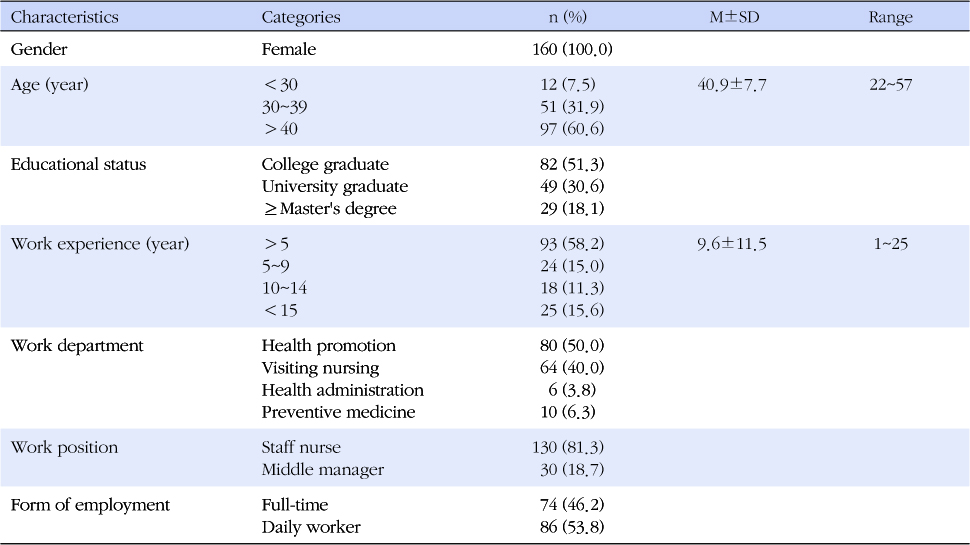
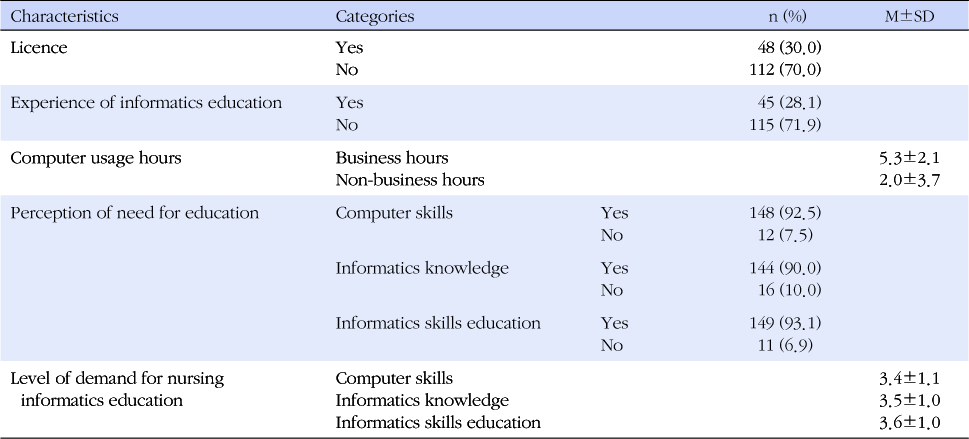
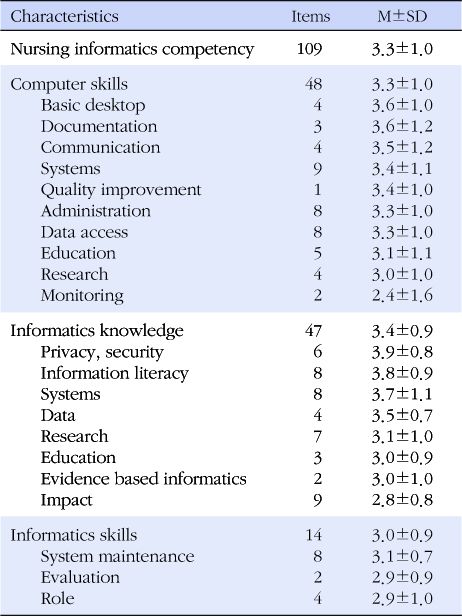
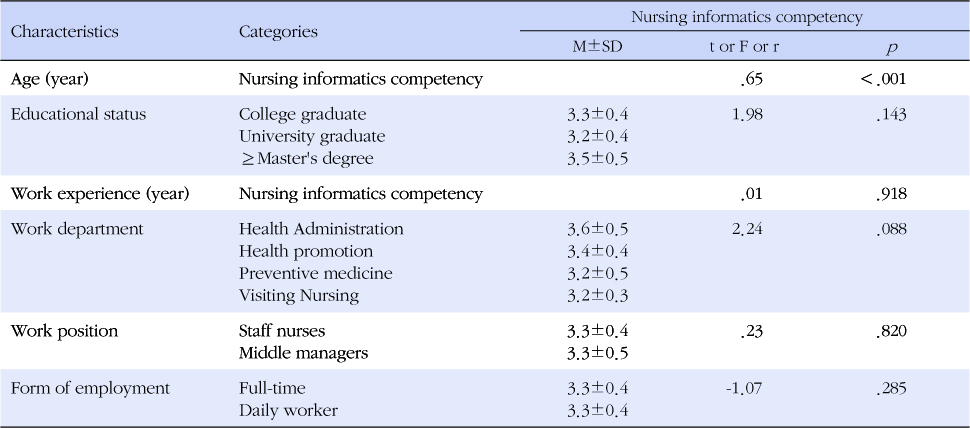
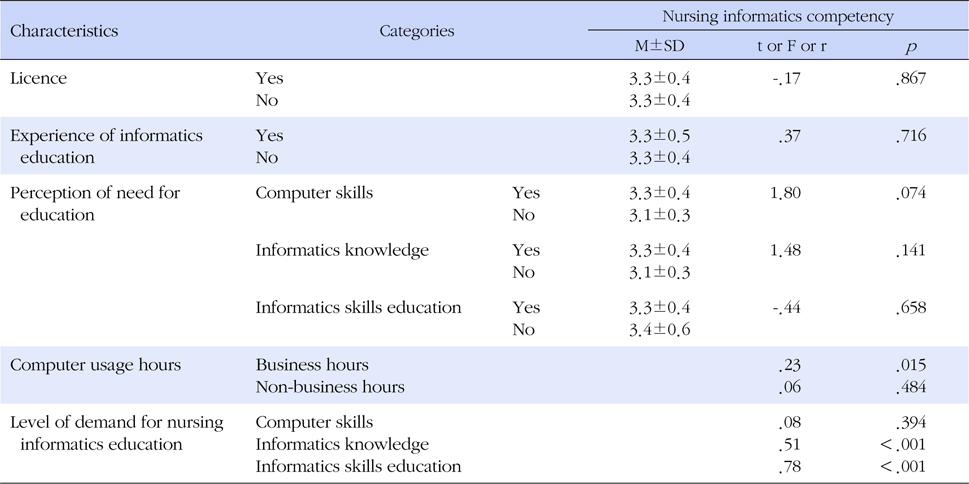
 PubReader
PubReader Cite
Cite

